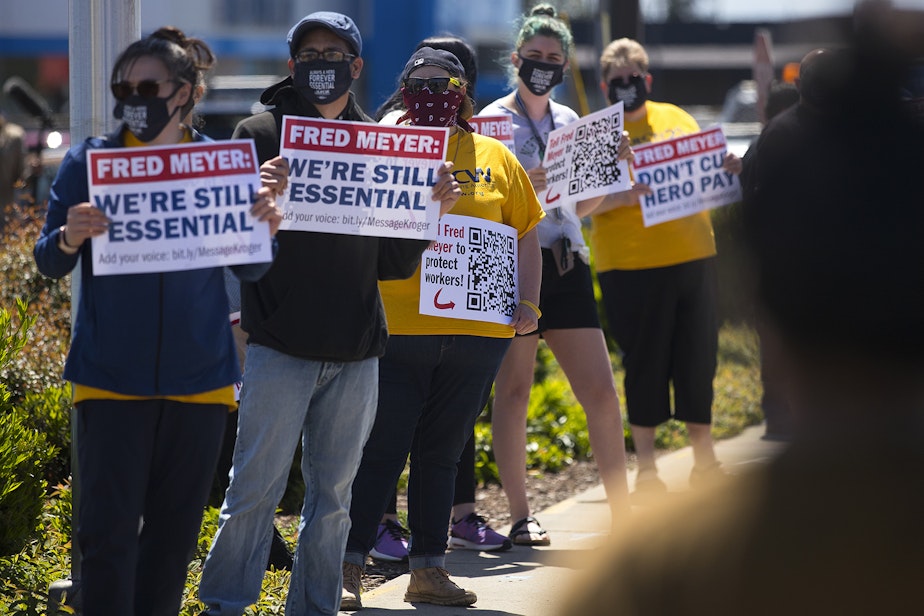$4 raise for grocery workers: Trade groups sue to block law

Trade groups representing Seattle grocery stores are suing to block the city’s new “hazard pay” rule for grocery workers. They filed the lawsuit in U.S. District Court in Seattle on Wednesday, the same day the emergency ordinance took effect.
The lawsuit says the temporary $4 hourly raise is arbitrary, because it singles out just one group of essential workers, and circumvents collective bargaining laws. They’re seeking an injunction to block the rule.
Amanda Dalton heads the Northwest Grocery Association. She said the Washington State Department of Health links grocery stores to just 5% of non-healthcare Covid outbreaks statewide, which she credits to safety measures the stores put in place.
“Grocery stores are not at the center of this community spread, both in Seattle and really in Washington,” Dalton said. “So I think that’s why we question why we’re being targeted under the council ordinance and we’re not talking about all essential workers.”
Dalton said the Seattle City Council enacted the measure quickly, without their input. But Seattle City Councilmember Teresa Mosqueda said she listened to industry concerns, and clarified that the hazard pay applies to frontline workers only.
“This is really about the folks who are on the ground in those grocery store floors, stocking shelves, who are having people reach over them – ‘reach for that zucchini’ as one grocery worker talked about – and feeling the customer’s breath on them," Mosqueda said.
Sponsored
Mosqueda pointed to a study in the British medical journal Occupational & Environmental Medicine last October that found "the positive rate of infection among grocery employees was five times as likely for those who interacted with customers than for those who did not.”
In filing their lawsuit, the industry groups also disputed the findings of a November report by the Brookings Institution that supermarket profits have soared during the pandemic as people cook from home.
Tammie Hetrick is President and CEO of the Washington Food Industry Association.
“That’s a national report, and it really doesn’t speak to what’s been happening in Washington and especially in Seattle,” Hetrick said.
“We’ve had challenges with theft, increased labor costs and cleaning,” she said. “Seattle really needs to be evaluated on its own merit, and we’re just not seeing profits in Seattle right now.”
Sponsored
She said one of the independent grocers that belongs to her association estimates the cost of hazard pay for their employees would be $98,000 per month.
In a letter to Seattle Mayor Jenny Durkan, the CEO of PCC Community Markets, Suzy Monford, said local independent grocers are especially harmed by the ordinance because they don’t have national stores to offset the cost, and they are being squeezed by fees from third-party delivery services.
“This ordinance disproportionately harms local, independent grocers like PCC Community Markets, which in 2019 had $1.7m in net income,” she wrote.
“That may sound like a lot, but to put that in context, PCC spent $3 million – or nearly two times 2019 net income — in Covid-related expenses in 2020, including staff member appreciation pay, bonuses and in-store safety protocols, since the start of the pandemic,” Monford said.
Durkan signed the ordinance this week.
Sponsored
On KUOW’s The Record on Thursday, the mayor said that she supports the emergency hazard pay, which lasts as long as Seattle’s pandemic emergency remains in effect.
“Cities have broad powers to insure the public safety of their workers in various settings,” Durkan said.
She said like many shoppers, she tries to keep her supermarket visits as brief as possible, and employees deserve the extra pay for working to keep supplies on the shelves.
“It makes me nervous because there’s so many people there,” Durkan said. “These workers are there six, eight, ten hours a day. They’re serving everyone who walks through the door at great risk to themselves. So I think it’s merited. I hope the trade association rethinks it. I’m confident we’ll win.”
Mosqueda said Seattle is one several cities on the West Coast to enact the emergency hazard pay, which was supported by the grocery workers’ union UFCW Local 21.
Sponsored
Trade groups have also filed lawsuits in Long Beach and Oakland, California to block the measures. The Kroger Co. also said it plans to close two “long-struggling” stores in Long Beach due to the hazard pay mandate.
Mosqueda said she was disappointed that grocery stores offered hazard pay for a just few months last spring.
“This is a short-term measure to make sure that those who are in hazard’s way get the hazard pay that they deserve,” she said. “It’s unfortunate that the lawsuit has come forward, but like these other cities we’re going to continue.”
In a statement, Dan Nolte, a spokesperson for the Seattle City Attorney’s office, said: “We will absolutely defend the City's right to see essential grocery workers receive the hazard pay they so rightly deserve.”
Nolte added, “My father-in-law works at the Ballard QFC and previously caught Covid, so I'm personally very happy that our office is defending this one.”
Sponsored
Nolte said his father-in-law recovered and they don’t know how he contracted it. But Nolte said “he's worked there throughout the entire pandemic, with the exception of the time he quarantined.”
No hearing date has been set for the lawsuit.




